初二英语-园区讲义920
- 格式:docx
- 大小:26.46 KB
- 文档页数:5
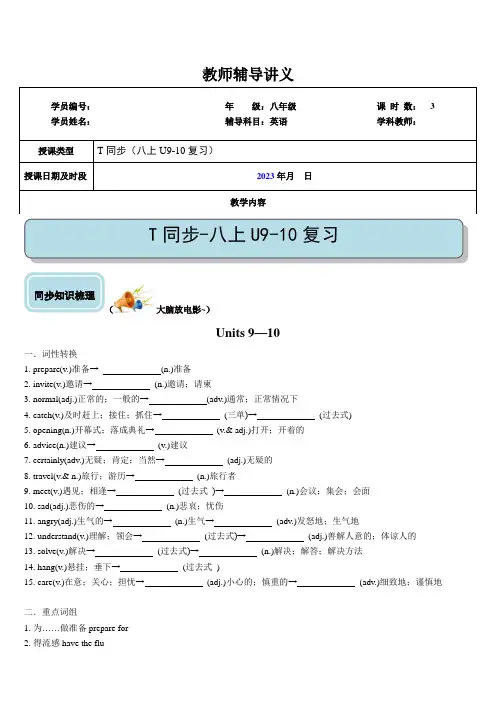
教师辅导讲义学员编号:年级:八年级课时数: 3 学员姓名:辅导科目:英语学科教师:授课类型T同步(八上U9-10复习)授课日期及时段2023年月日教学内容T同步-八上U9-10复习同步知识梳理(大脑放电影~)Units 9—10一.词性转换1.prepare(v.)准备→(n.)准备2.invite(v.)邀请→(n.)邀请;请柬3.normal(adj.)正常的;一般的→(adv.)通常;正常情况下4.catch(v.)及时赶上;接住;抓住→(三单)→(过去式)5.opening(n.)开幕式;落成典礼→(v.& adj.)打开;开着的6.advice(n.)建议→(v.)建议7.certainly(adv.)无疑;肯定;当然→(adj.)无疑的8.travel(v.& n.)旅行;游历→(n.)旅行者9.meet(v.)遇见;相逢→(过去式)→(n.)会议;集会;会面10.sad(adj.)悲伤的→(n.)悲哀;忧伤11.angry(adj.)生气的→(n.)生气→(adv.)发怒地;生气地12.understand(v.)理解;领会→(过去式)→(adj.)善解人意的;体谅人的13.solve(v.)解决→(过去式)→(n.)解决;解答;解决方法14.hang(v.)悬挂;垂下→(过去式)15.care(v.)在意;关心;担忧→(adj.)小心的;慎重的→(adv.)细致地;谨慎地二.重点词组1.为……做准备prepare for2.得流感have the flu3.闲逛;常去某处hang out4.照料;照顾look after5.(帮助……)分担工作、解决难题help out6.盼望;期待look forward to doing sth.7.接到(某人的)信、电话等hear from8.保守秘密keep…to oneself16.分成两半in half三.重点句子1.What a great idea it is! 多棒的一个主意啊!2.I look forward to hearing from you all.我期待收到你们所有人的来信。
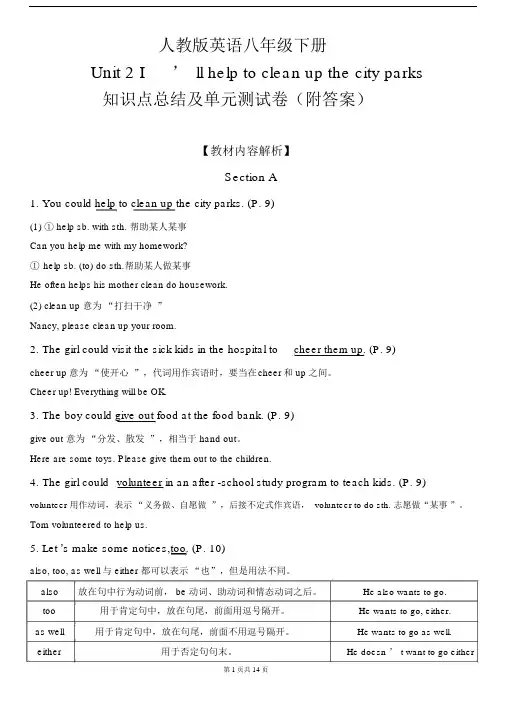
人教版英语八年级下册Unit 2 I’ ll help to clean up the city parks知识点总结及单元测试卷(附答案)【教材内容解析】Section A1. You could help to clean up the city parks. (P. 9)(1) ① help sb. with sth. 帮助某人某事Can you help me with my homework?①help sb. (to) do sth.帮助某人做某事He often helps his mother clean do housework.(2)clean up 意为“打扫干净”Nancy, please clean up your room.2. The girl could visit the sick kids in the hospital to cheer them up. (P. 9)cheer up意为“使开心”,代词用作宾语时,要当在cheer和 up 之间。
Cheer up! Everything will be OK.3. The boy could give out food at the food bank. (P. 9)give out 意为“分发、散发”,相当于 hand out。
Here are some toys. Please give them out to the children.4. The girl could volunteer in an after -school study program to teach kids. (P. 9)volunteer 用作动词,表示“义务做、自愿做”,后接不定式作宾语, volunteer to do sth. 志愿做“某事”。
Tom volunteered to help us.5. Let ’s make some notices,too. (P. 10)also, too, as well与 either 都可以表示“也”,但是用法不同。
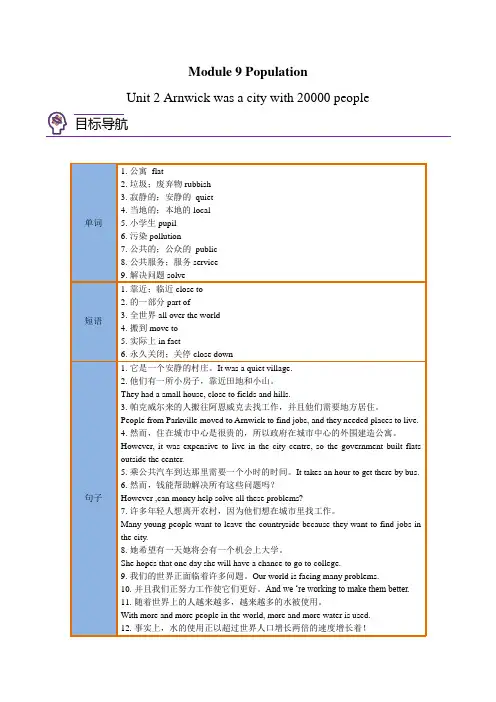
Module 9 PopulationUnit 2 Arnwick was a city with 20000 peopleIn fact, water use is growing more than twice as tw ice as fast as the world’spopulation.13.因此,在许多地方获取好而干净的水正成为一个问题。
As a result, getting good ,clean water is being a problem in many places.单元语法冠词和数词知识精讲1.When Jo’s grandparents first came to Parkville, it was a quiet village. 乔的祖父母第一次来到帕克维尔时,那是一个安静的乡村。
【知识点】quiet安静的,静止的☞They walked to a quiet place.他们步行去了一个安静的地方。
【拓展】quietly副词,安静的☞The girl is sitting on the sofa quietly.女孩正安静地坐在沙发上。
2.They had a small house, close to fields and hills. 他们有一所小房子,靠近田地和小山。
【知识点1】closeclose to 靠近☞Her home is close to the school.3.The small local school in Parkville closed down five years ago, so Jo now has to go to a school in Arnwick with 2000 pupils. 帕克维尔当地的小学校五年前就关闭了,所以乔现在得去阿恩威克的一个有2000名学生的学校上学。
【知识点】close down关闭,关停☞They will have to close down soon. Business is too bad.【辨析】close与closed4.It takes an hour to get there by bus. 乘公共汽车到达那要花费一个小时的时间。
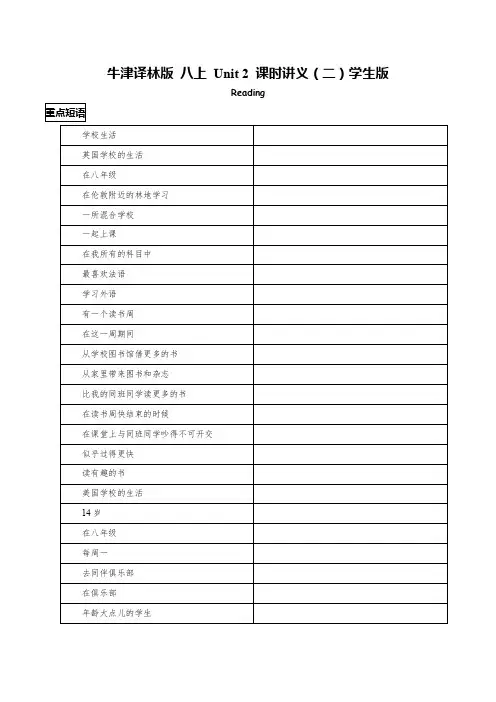
牛津译林版八上Unit 2 课时讲义(二)学生版Reading1.I am in Year 8 at Woodland School near London. 我在伦敦附近的林地学习读八年级。
I’m in the 8th grade at... 我在……八年级______________:“在八年级”= ________________。
表示年级:______________________ = _____________________________。
2.It is a mixed school. 这是一所混合式学校。
mixed:adj.“男女混合的;混合的”。
_______:v.“(使)混合,掺和”。
______________ = ______________ “将A和B混合在一起”。
___________ “混合在一起”。
3.Among all my subjects, I like French best. 在所有的科目中,我最喜欢法语。
like...best:“最喜欢……”= ___________。
French:n.“法语”;adj.“法国的,法国人的,法语的”。
_________:n.“法国”。
__________:n.“法国人”。
复数:____________。
4.Learning foreign languages is fun. 学习外语很有趣。
foreign:adj.“外国的”。
___________:n.“外国人”。
动名词(短语)作主语:单个动名词(短语)作主语时,谓语动词用________形式。
5.During the week, we can borrow more books from the school library. 在这一周期间,我们可以从学校图书馆借更多的书。
during:prep. “在……期间;在……的过程中”。
borrow:vt.“借入”。
辨析:borrow/lend/keepborrow:“借入”,指从别人或别处借东西,为非延续性动词。
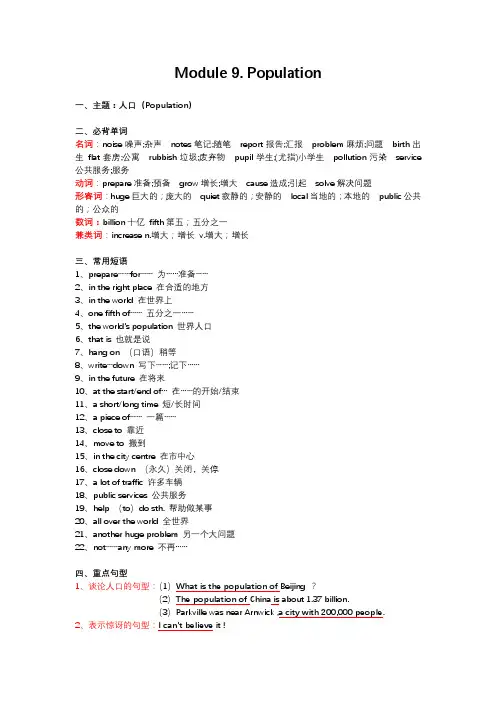
Module 9. Population一、主题:人口(Population)二、必背单词名词:noise噪声;杂声notes笔记;随笔report报告;汇报problem麻烦;问题birth出生flat套房;公寓rubbish垃圾;废弃物pupil学生;(尤指)小学生pollution污染service 公共服务;服务动词:prepare准备;预备grow增长;增大cause造成;引起solve解决问题形容词:huge巨大的;庞大的quiet寂静的;安静的local当地的;本地的public公共的;公众的数词:billion十亿fifth第五;五分之一兼类词:increase n.增大;增长v.增大;增长三、常用短语1、prepare……for…… 为……准备……2、in the right place 在合适的地方3、in the world 在世界上4、one fifth of…… 五分之一……5、the world’s population 世界人口6、that is 也就是说7、hang on (口语)稍等8、write…down 写下……;记下……9、in the future 在将来10、at the start/end of… 在……的开始/结束11、a short/long time 短/长时间12、a piece of…… 一篇……13、close to 靠近14、move to 搬到15、in the city centre 在市中心16、close down (永久)关闭,关停17、a lot of traffic 许多车辆18、public services 公共服务19、help (to)do sth. 帮助做某事20、all over the world 全世界21、another huge problem 另一个大问题22、not……any more 不再……四、重点句型1、谈论人口的句型:(1)What is the population of Beijing ?(2)The population of China is about 1.37 billion.(3)Parkville was near Arnwick ,a city with 200,000 people.2、表示惊讶的句型:I c an’t believe it !3、表示请求问候的句型:Hang on a minute !五、模块语法1、冠词(不定冠词a/an、定冠词the和零冠词)2、数字(nine hundred and seventy-eight、two hundred and three)Module 9.Population详细笔记1. I’m preparing some notes for a report called "Our growing population.”我正在为一篇题为“我们日益增长的人口"的报告准备一些笔记。
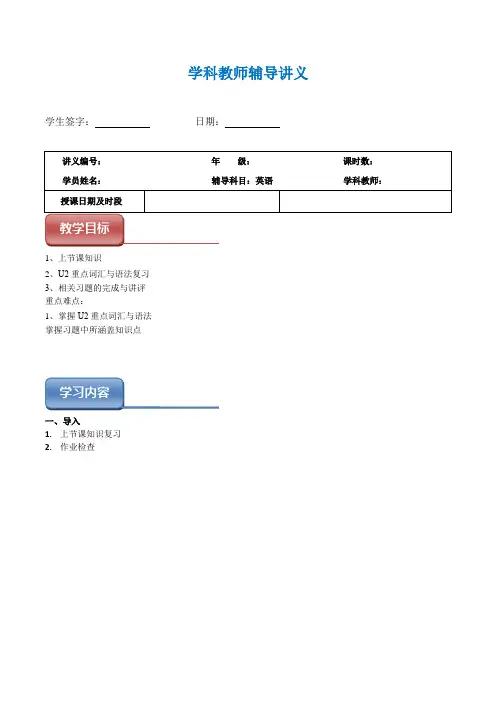
学科教师辅导讲义学生签字:日期:讲义编号:年级:课时数:学员姓名:辅导科目:英语学科教师:授课日期及时段教学目标1、上节课知识2、U2重点词汇与语法复习3、相关习题的完成与讲评重点难点:1、掌握U2重点词汇与语法掌握习题中所涵盖知识点学习内容一、导入1.上节课知识复习2.作业检查23.more than 多于;超过 24.less than 少于25.at least 至少 26.have dance and piano lessons 上舞蹈课和钢琴课用法集萃1.help sb. with sth.=help sb (to)do sth 帮助某人做某事2.How about…?=What about… ......怎么样?/ ……好不好?3.want sb. to do sth.=would like sb to d o sth 想让某人做某事4.How many+可数名词复数+一般疑问句?…有多少…?5.It’s+ adj.+ to do sth. 做某事是……的。
6.by doi ng sth. 通过做某事7.the best way to do sth. 做某事的最好方式~~~~~~~~~~~~~~~~~~~~~~~~~~~~~~~~~~~~~~~~~~~~~~~~~~~~~~~~~~~~~~~~~~~~~~~~~~~~~~~~~~~~~~~~~~二、知识梳理+经典例题第一部分:词汇精讲1. 次数的表达. once, twice, three times等次数的表达法。
1) 这三个词都表示____,once是____,twice是____,除了一次,两次,其他的次数都表达___________。
如:三次是__________,五次是_________。
2. 【辨析】maybe与may bemaybe是副词,在句子做状语。
may be 是情态动词may与动词原形be一起构成句子的谓语动词意为“可能是”,它们有时也可互换。
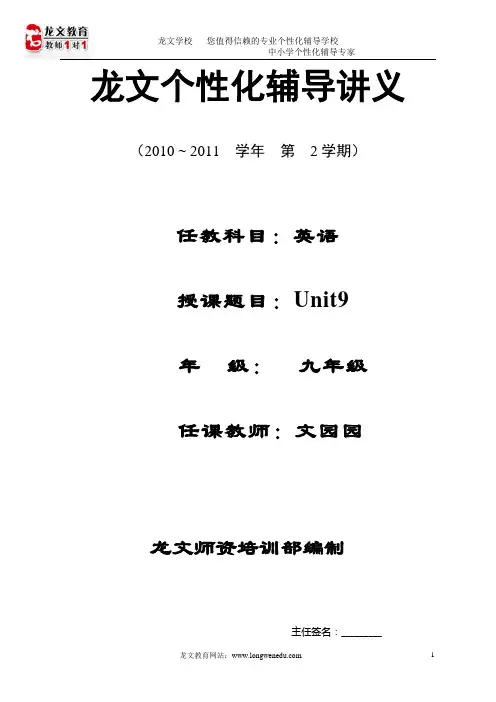
龙文个性化辅导讲义(2010 ~ 2011 学年第2学期)任教科目:英语授课题目:Unit9年级:九年级任课教师:文园园龙文师资培训部编制主任签名:_________日期:__________龙文个性化辅导教案授课教师文园园授课对象余子齐授课时间12月24号授课题目英语课型同步辅导使用教具白纸教学目标掌握第九单元重难点和易错点教学重点和难点各种单词的相近词义辨析,常用的词语搭配,一般过去式参考教材教学内容。
一.基础知识回顾1.单词2.短语二.重难点1.Who’s that? 那人是谁?用来询问对方是谁,一般很少这样用,不符合礼仪习惯,一般这样的,我们用that/it 回来,而不用she/he,.--Who’s that? -- Mr Green, our English teacher.2.She is a great Chinese ping-pong player.great的讲解:1)伟大的,大的 a great man 伟人 a great picture 名画2)重大的,非常的 a great decision 重大的决定3)在口语中意为“妙,好”等于wonderful That’s great.4) 用于地名,事件名称等。
the Great wall 长城the Great Hall of the people 人民大会堂辨析:great,big和large都有大的意思。
great 大,伟大,常用于抽象,精神上的大;big 大,指容积,体积大;large 大,指面积大。
3..When was she born? 她是什么时候出生的?be born 意为“出生,出世”为被动语态,born是动词bear的过去分词。
一般用过去时态,特殊情况可以用将来时,即will be born. Another baby will be born next month.4..hiccupping world record 打嗝的世界记录1)world records 世界记录2)①record n. 记录,记载打破记录②record v.记载,记录The programme was recorded.5.When did he start hiccupping? 你什么时候开始打嗝的?1)start 出发起程We must start early.2) start 开始着手start work 着手工作辨析:start与begin两者都有“开始”的意思start 动作性较强,着重于开始或着手这一点,带有“突然开始”的意思Let’s start to do it at once.begin 指开始某一行动或进程。
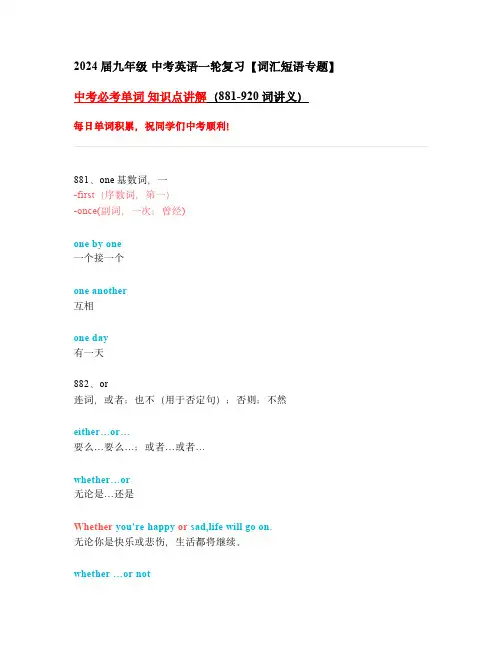
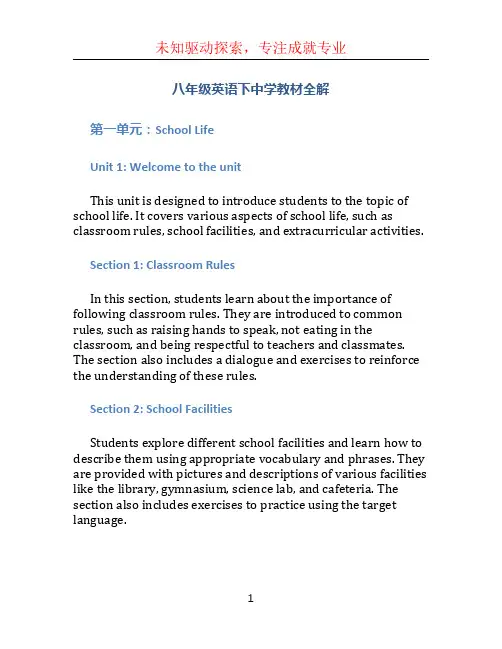
八年级英语下中学教材全解第一单元:School LifeUnit 1: Welcome to the unitThis unit is designed to introduce students to the topic of school life. It covers various aspects of school life, such as classroom rules, school facilities, and extracurricular activities.Section 1: Classroom RulesIn this section, students learn about the importance of following classroom rules. They are introduced to common rules, such as raising hands to speak, not eating in the classroom, and being respectful to teachers and classmates. The section also includes a dialogue and exercises to reinforce the understanding of these rules.Section 2: School FacilitiesStudents explore different school facilities and learn how to describe them using appropriate vocabulary and phrases. They are provided with pictures and descriptions of various facilities like the library, gymnasium, science lab, and cafeteria. The section also includes exercises to practice using the target language.Section 3: Extracurricular ActivitiesIn this section, students learn vocabulary related to extracurricular activities such as sports, clubs, and school events. They engage in dialogues and role-plays to practice talking about their favorite activities and how to join them. The section also provides information on different school clubs and events to broaden students’ knowledge and inspire their interests.Unit 2: My School LifeUnit 2 focuses on exploring students’ daily school life and experiences. It aims to improve students’ ability to communicate in various real-life situations.Section 1: Daily RoutinesThis section introduces students to vocabulary and phrases related to daily routines. They learn how to talk about their daily schedules, including waking up, going to school, attending classes, and doing homework. The section includes reading passages and speaking exercises to help students practice using the target language.Section 2: School SubjectsStudents are introduced to different school subjects in this section. They learn to express their opinions, preferences, and reasons regarding their favorite subjects. They also learn related vocabulary and phrases for each subject, including English, math, science, history, and physical education.Section 3: School MemoriesIn this section, students engage in activities that help them reflect on their school memories. They learn how to talk about their favorite school memories, friends, teachers, and experiences. The section includes reading passages, writing prompts, and speaking exercises to encourage students to express themselves.Unit 3: Hobbies and InterestsUnit 3 focuses on developing students’ ability to express their hobbies and interests in English. It covers a wide range of topics, including sports, music, reading, and outdoor activities.Section 1: Sports and ActivitiesIn this section, students learn vocabulary related to different sports and activities. They practice talking about their favorite sports, outdoor activities, and hobbies. The section includes listening exercises, reading passages, and speaking activities to develop students’ listening, reading, and speaking skills.Section 2: Music and InstrumentsStudents explore the topic of music and instruments in this section. They learn vocabulary related to different musical genres, instruments, and famous musicians. They also learn how to express their musical preferences and talk about their experiences with music. The section includes listening exercises, reading passages, and speaking activities to further develop students’ language skills.Section 3: Reading and BooksIn this section, students focus on the topic of reading and books. They learn vocabulary related to different genres, authors, and book types. Students are encouraged to talk about their favorite books, reading habits, and opinions on different literary works. The section includes reading passages, comprehension questions, and speaking activities to enhance students’ reading and speaking abilities.Unit 4: My Family and FriendsUnit 4 aims to develop students’ ability to talk about thei r family members and friends. It covers topics such as family relationships, describing people, and friendship.Section 1: Family MembersIn this section, students learn vocabulary related to family members and relationships. They practice describing their family members and talking about their roles and relationships within the family. The section includes listening exercises, reading passages, and speaking activities to improve students’ language skills.Section 2: Describing PeopleStudents learn how to describe people, including physical appearance, personality traits, and interests. They practice using adjectives to describe themselves, their family members, and friends. The section includes listening exercises, reading passages, and speaking activities to strengthen students’ descriptive language skills.Section 3: FriendshipIn this section, students explore the topic of friendship. They learn vocabulary related to friendship, qualities of a good friend, and ways to maintain friendships. Students engage in dialogues, role-plays, and writing activities to express their thoughts and experiences regarding friendship.ConclusionThe eighth-grade English textbook provides comprehensive coverage of various topics related to school life, hobbies, relationships, and personal experiences. The units and sections are designed to enhance students’ vocabulary, grammar, reading, writing, listening, and speaking skills. By actively engaging in the exercises and activities provided in the textbook, students can improve their overall English language proficiency.。
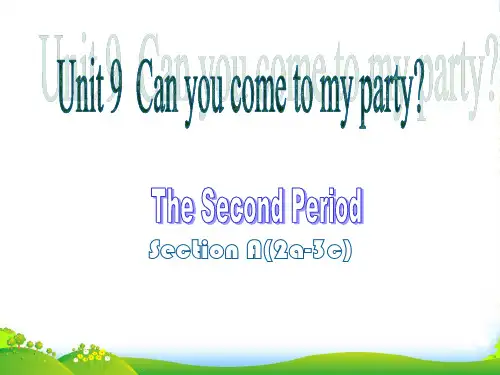
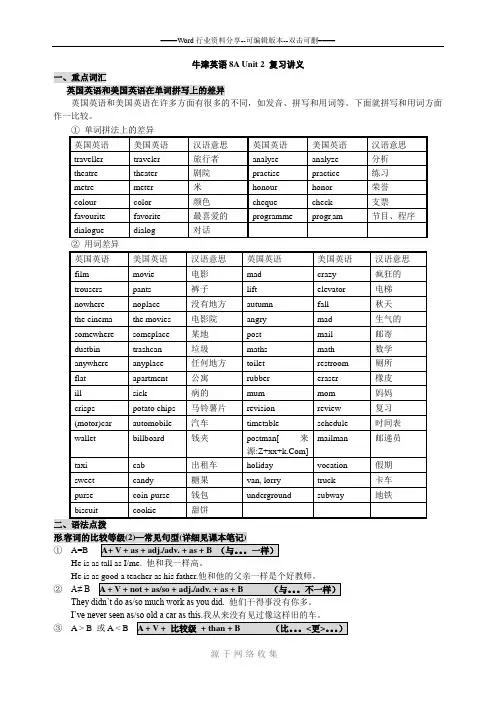
牛津英语8A Unit 2 复习讲义一、重点词汇英国英语和美国英语在单词拼写上的差异英国英语和美国英语在许多方面有很多的不同,如发音、拼写和用词等。
下面就拼写和用词方面作一比较。
①单词拼法上的差异英国英语美国英语汉语意思英国英语美国英语汉语意思traveller traveler 旅行者analyse analyze 分析theatre theater 剧院practise practice 练习metre meter 米honour honor 荣誉colour color 颜色cheque check 支票favourite favorite 最喜爱的programme progr am 节目、程序dialogue dialog 对话②用词差异英国英语美国英语汉语意思英国英语美国英语汉语意思film movie 电影mad crazy 疯狂的trousers pants 裤子lift elevator 电梯nowhere noplace 没有地方autumn fall 秋天the cinema the movies 电影院angry mad 生气的somewhere someplace 某地post mail 邮寄dustbin trashcan 垃圾maths math 数学anywhere anyplace 任何地方toilet restroom 厕所flat apartment 公寓rubber eraser 橡皮ill sick 病的mum mom 妈妈crisps potato chips 马铃薯片revision review 复习(motor)car automobile 汽车timetable schedule 时间表mailman 邮递员wallet billboard 钱夹postman[来源:Z+xx+]taxi cab 出租车holiday vocation 假期sweet candy 糖果van, lorry truck 卡车purse coin-purse 钱包underground subway 地铁biscuit cookie 甜饼二、语法点拨形容词的比较等级(2)—常见句型(详细见课本笔记)①A=B A+ V + as + adj./adv. + as + B (与。
Unit 9 Section B目标导航单词without prep.没有;不(做某事)invitation n.邀请;请柬surprised adj.惊奇的;感觉意外的reply v.回答;答复forward v.转寄;发送adv.向前;前进opening n.开幕式;落成典礼concert n.音乐会;演奏会print v.印刷;打印sad adj.(令人)难过的;(令人)悲哀的event n.大事;公开活动;比赛项目guest n.客人;宾客glad adj.高兴;愿意calendar n.日历;日程表preparation n.准备;准备工作daytime n.日间;白天短语the day before yesterday 前天take a trip 去旅行the day after tomorrow后天help out(帮助······)分担工作、解决难题turn down 拒绝look forward to 盼望;期待look after 照顾;照料hear from接到(某人的)信、等用法归纳forward to sth.期待某事,盼望某事look forward to doing sth 期盼做某事be surprised to do sth对做某事感到惊讶be surprised at sth 对某事感到吃惊see sb do sth看见某人做过某事(看见全过程)see sb doing sth看见某人正在做某事(事情正在被做)句子 1.Bring Ms. Steen to the party without telling her so that she can be surprised.在斯蒂恩老师不知情的情况下带她来参加聚会,这样会给她带来惊喜。
2.I look forward to hearing from you all.我期待你们所有人的回信。
建通教育八年级上册英语讲义目录Unit 1 Where did you go on vacation?Unit 2 How often do you exercise?Unit 3 I'm more outgoing than my sisterUnit 4 What's the best movie theater?Unit5 Do you want to watch a game show?Unit6 I’m going to study computer science。
Unit7 Will people have robots?Unit8 How do you make a banana milk shake?Unit9 Can you come to my party?Unit10 If you go to the party,you’ll have a great time.语法总览Unit 1 复合不定代词,一般过去时的规则动词与不规则动词Unit 2频度副词Unit 3 形容词和副词比较级Unit 4形容词和副词的最高级Unit5动词不定式作宾语Unit6一般将来时:be going to do 的用法Unit7 一般将来时:will do 的用法Unit8可数名词与不可数名词,祈使句Unit9 can表示邀请的用法及其回答Unit10 if引导的条件状语从句;should 的用法Unit1 where did you go on vacation? 一、重点词汇anyone ['eniwʌn]pron。
任何人wonderful ['wʌndəfl]adj.精彩的;极好的few [fjuː]adj.很少的;n。
少量something ['sʌmθɪŋ]pron。
某事物;nothing(=not…anything) ['nʌθɪŋ] pron。
初二11月28日和12月5日讲义()1. “Must we do it now?” “No, you______.” (79)A. won’tB. needn’tC. can’tD. don’t()2. He said he would rather not______ it right now. (79)A. doingB. to doC. doD. to be doing()3. You____ to the meeting this afternoon if you have something important to do. (81)A. needn’t to comeB. don’t **eC. don’t **ingD. needn’t come()4. I_____ play football than basketball. (82)A. would ratherB. had betterC. like betterD. prefer()5. “May I pick a flower in the garden ? ” “________”. (83)A. No, you needn’tB. Not, pleaseC. No, you mustn’tD. No, you won’t()6. You’d better __________ late next time. (83)A. don’tB. not beC. not beingD. won’t be()7. --- Can I leave this door open at night ? --- You_____ better not. (85)A. shouldB. hadC. wouldD. could()8. Put on more clothes. You ____ be feeling cold with only a shirt on. (85)A. canB. couldC. wouldD. must()9. I thought you_____ like something to read, so I have brought you some books. (86)A. mayB. mightC. couldD. must()10. It’s freezing outside. You ____ put on your overcoat. (87)A. had better toB. had betterC. would betterD. would better to()13. You ____ return the book now. You can keep it till next week if you like. (88)A. can’tB. mustn’tC. needn’tD. may not()14.We____ for her because she never came. (88)A. needn’t waitB. shouldn’t have waitedC. mustn’t waitD. mustn’t have waited()15.Mother_____us stories when we were young. (88)A. was used to tellB. is used to tellingC. used to tellD. used to telling()19. A computer ______ think for itself; it must be told what to do. (91)A. can’tB. couldn’tC. may notD. might not()20. Jenny _______ have kept her word. I wonder why she changed her mind. (91)A. mustB. shouldC. needD. would()22. ---Could I borrow your dictionary ? ---Yes, of course you________ . (92)A. mightB. willC. canD. should()25. Peter _____ come with us tonight, but he isn’t very sure yet. (93)A. mustB. mayC. canD. will()27.---Don’t forget to come to my birthday party tomorrow. --- _________ . (94)A.I don’tB. I won’tC. I can’tD.I haven’t()28.---Shall I tell John about it ? ---No, you____. I’ve told him already. (N94)A. needn’tB. wouldn’tC. mustn’tD. shouldn’t()36.---When can I come for the photos ? I need them tomorrow afternoon . (98)---They ______ be ready by 12:00 .A. canB. shouldC. mightD. need()38.---Will you stay for lunch ? ---Sorry, _____. My brother is coming to see me . (99)A. I mustn’tB. I can’tC. I needn’tD. I won’t()72.Tom, you _____ leave all your clothes on the floor like this ! (NMET2005年全国卷I,26)A.wouldn’t B. mustn’t C. needn’t D. may not()73. John, look at the time. _____ you play the piano at such a late hour ?(NMET2005年全国卷II,19)A. MustB. CanC. MayD. Need()74.He _____ **pleted his work; otherwise, he wouldn’t be enjoying himself by the seaside. (NMET2005年北京卷,26)A. shouldB. mustC. wouldn’tD. can’tA.根据句意,用所给词的适当形式填空。
8AGrammar1.adjectiveI heard the terrible noise last night . (句子成分:_________)I was alone in the house . The news sounds exciting.(句子成分:_____________)写出下列单词的比较级和最高级:clean _________ _________; wide ________ ________ ; thin ________ ________; heavy ________; ________ clever __________;_________ narrow _______ _______; simple _________ ________; able _________ _______; difficult __________ ________; slowly _______ ________; much (many ) ______ ______; good ______ ______ ; bad (ill, badly ) ______ ______ few _______ ______ ; little _______; _______ far _______ _______ ; early ______ _____ ; easily______ ______1.He is as ________as his father (clever ) You are not as _______ he (active).2.The story is _______ (cheap ) than that one . He is much _________(tall ) .3.This is ________ (good ) film that I have ever seen .She is __________ (beautiful) girl in the model team .Millie is __________ (slow ) student of the six students .4.She has _________ football stickers than I .(多于) . Simon has ______ orangejuice than Amy. (多于) She has __________ stamps in his class . (最多)5.Nancy joins _______clubs than I (少于). We try to spend ______ money than theother team . (少于) . Tom has ______ oranges of the three . (最少) . The bottle with _______ water is Kitty’s . (最少)2.like 与alike 的用法: (选词填空1-5)1.This coat is _______ that one .2. The two songs sound ________.2.Great minds think ________. 4. The man in the picture looks ______ Mr wang.6.You should do it ______ what you said .6.You should do it _____ you said .(填词) 3.be different from ; be the same as我的书和你的不同. __________________________________我制服和约翰的一样.____________________________________________.4.连词: and / but / orand 用来连接语法作用相同的词,短语或句子表示“和”but 用来连接有对立或对照性的词,短语或句子表示“但是,然而,却”or 表示二者选择其一,是“或者,还是”后面的谓语由or 后面的主语决定。
牛津英语8A课堂教学评估练习 Unit 1一、单词拼写根据句意及首字母或中文提示, 完成下列句子中的单词。
(5分)1. He has bad e_________ because of too **puter work at night.2. My English teacher has a good sense of h__________.3. He is 1.80 meters in h__________.4. I borrow three m_________ from the library every month.5. “Harry Potter” was very p__________ in the students a few years ago.二、词形转换用所给单词的适当形式填空。
(第小题1分,满分5分)1. He helps us a lot, he is a __________ (help) student.2. This film is very boring I felt _________ (bore).3. I am a __________ (read) of yours, I read your every article in the newspaper.** is very clever, because he always answers the questions _________(correct).5. I am _________ (will) to teach these children.三、选择填空在下列每小题A,B,C,D四个选项中,选出一个可以填入空格内的最佳答案。
(每小题1分,满分10分)( ) 1. He always tells funny things to me and always ___________.A. makes me to laughB. makes me laughingC. makes me laughD. makes me laughs( ) 2. Today you look ___________ better.A. littleB. a littleC. lessD. very( ) 3. I want to sing around the world __________.A. in the futureB. in a futureC. on futureD. on the future( ) 4. I think swimming is __________ hiking.A. not as interesting asB. not interesting asC. not more interesting asD. not the most interesting( ) 5. Bob doesn’t know the way to the cinema. I don’t know, _________.A. tooB. eitherC. alsoD. neither( ) 6. She is ready to help people ___________.A. any timeB. anytimeC. some timeD. sometime( ) 7. Mr Zhou is good at __________ jokes.A. to tellB. tellC. tellingD. speaking( ) 8. Which is __________, the sun, the moon or the earth?A. bigB. biggerC. biggestD. the biggest( ) 9. He is __________ in my class.A. the nicest boysB. one of the nicest boyC. nicest boyD. one of the nicest boys( ) 10. My English is so poor, so I _________ my English.A. need help withB. need to helpC. need for helpingD. need helping四、句型转换根据括号内的要求改写句子。
(每小格1分,满分10分)1. I don’t know what I shall do. (同义句)I don’t know ___________ ____________ ___________.2. Cycling is exciting. Skiing is exciting too. (合并成一句)Cycling is ___________ ___________ ___________ skiing.3. There is n’t anything else in the fridge. (同义句)There is ___________ ___________ in the fridge.4. Peter is 1.70 meters tall. Mike is 1.68 meters tall. (合并成一句)_____________________________________________________5. Tom is smart, almost 1.75 metres. (对画线部分提问)_____________________________________________________五、完成句子(10分)1. Betty很大方。
她愿意和她的朋友们分吃那些苹果。
_________________________________________________________2. 游泳不如滑雪有趣。
_________________________________________________________3. 我可以吃点东西吗?_________________________________________________________4. Peter在所有孩子中年龄最大。
_________________________________________________________5. 当他长大的时候,他想成为一个歌手,环游世界。
_________________________________________________________六、单句改错下面每一句中均有一处错误,请找出并在右边的横线上改正。
(10分)( ) _________ 1. Excuse me, can I have anything to eat?A B C D( ) _________ 2. Joy has long hair. She is as slimmer as Betty.A B C D( ) _________3. Max often tells funny stories and makes us happily.A B C D( ) _________4. I **fort when I lie in bed.A B C D( ) _________5. She is 35 years old. She is older of the two sisters.A B C D七、完形填空先通读下列短文,掌握其大意,然后从A, B, C, D四个选项中选出最佳答案。
(10分)Last year Tome left school. He came to Taipei to _1_ a job(工作). He went from **pany(公司) to another but _2_ wanted him. Now he had little money. He had to go back to his small town. So he came to the station. He felt _3_ and tired. It was very late at night and _4_ was full of people. They were waiting _5_ tickets of the last train. He bought the last ticket, and he was very happy.At that time, a woman with a crying baby walked to him. She asked him to sell her the ticket. He gave her the ticket. He thought they needed it _6_ he did. After _7_ left, he sat on the bench(长凳) and didn’t know _8_ to go. Just then, an old man came and said, “You ng man, I _9_ what you did to the woman. I have a **pany. I need a good young man like _10_. Would you like to work for me?”( )1. A. find B. see C. look for D. buy( )2. A. everyone B. no one C. nothing D. something( )3. A. happy B. interesting C. sad D. glad( )4. A. the city B. **pany C. the farm D. the station( )5. A. to buy B. to sell C. to give D. to pass( )6. A. less than B. more than C. smaller them D. worse than( )7. A. Tom B. the bus C. the train D. the old man( )8. A. what B. which C. why D. where( )9. A. have seen B. don’t know C. don’t like D. have done( )10. A. the woman B. you C. the baby D. her八、阅读理解阅读下列短文,从题中所给的A, B, C, D四个选项中选出最佳答案。